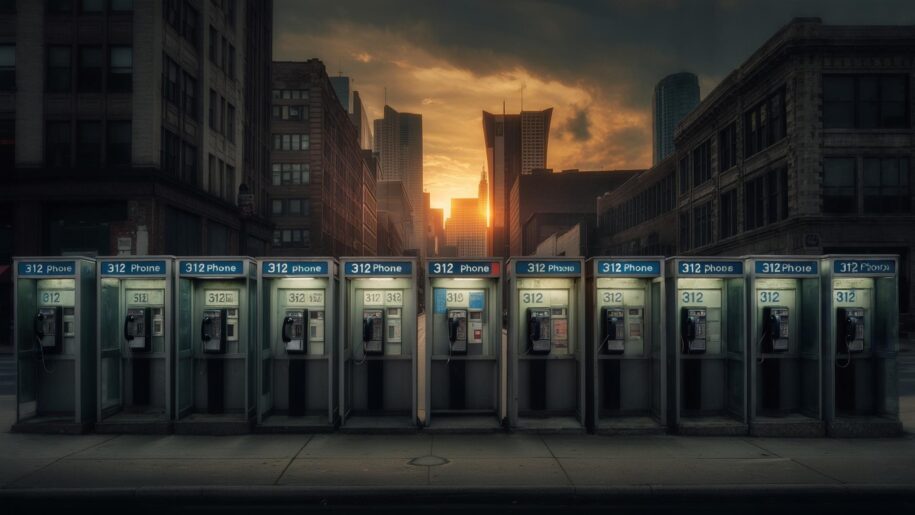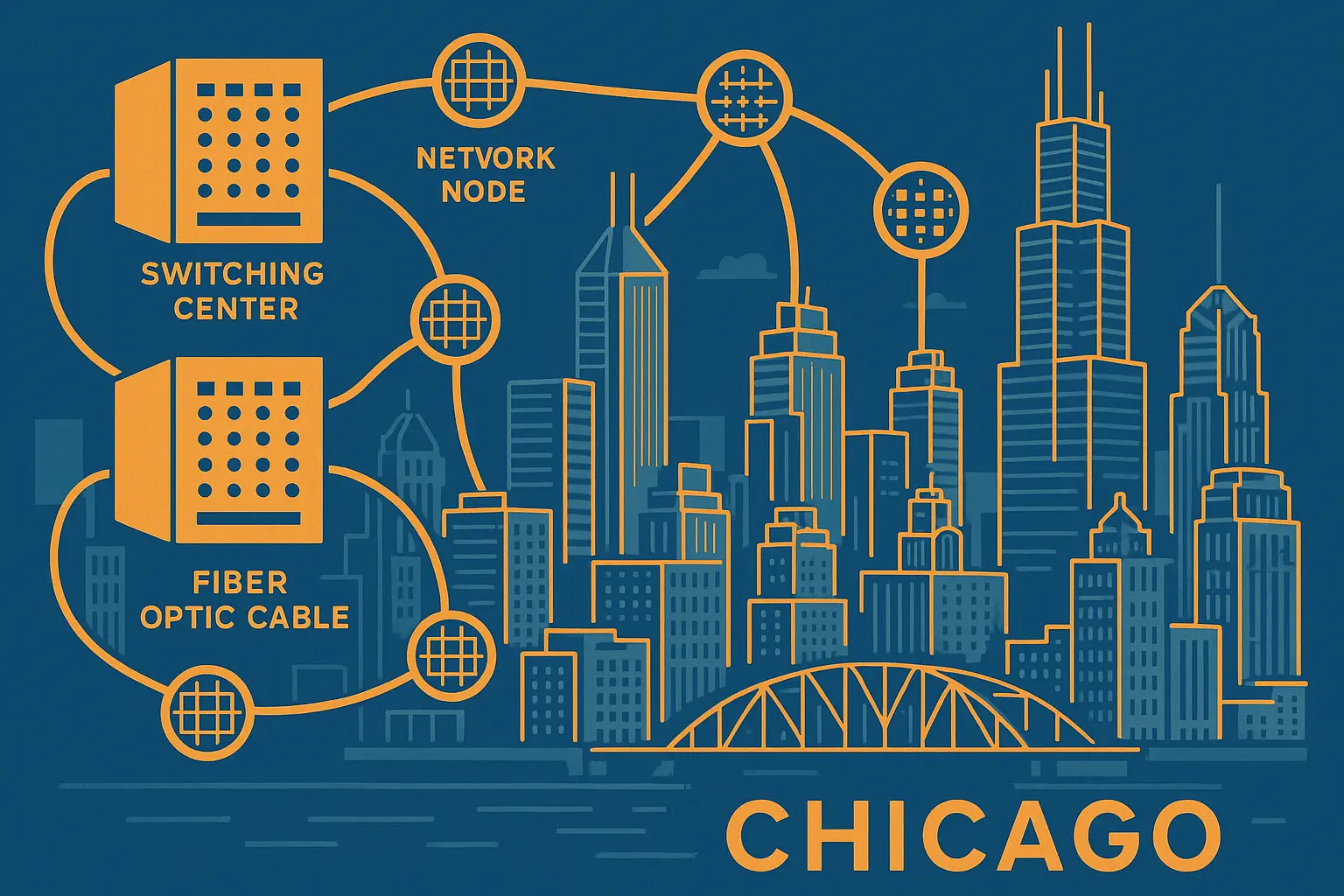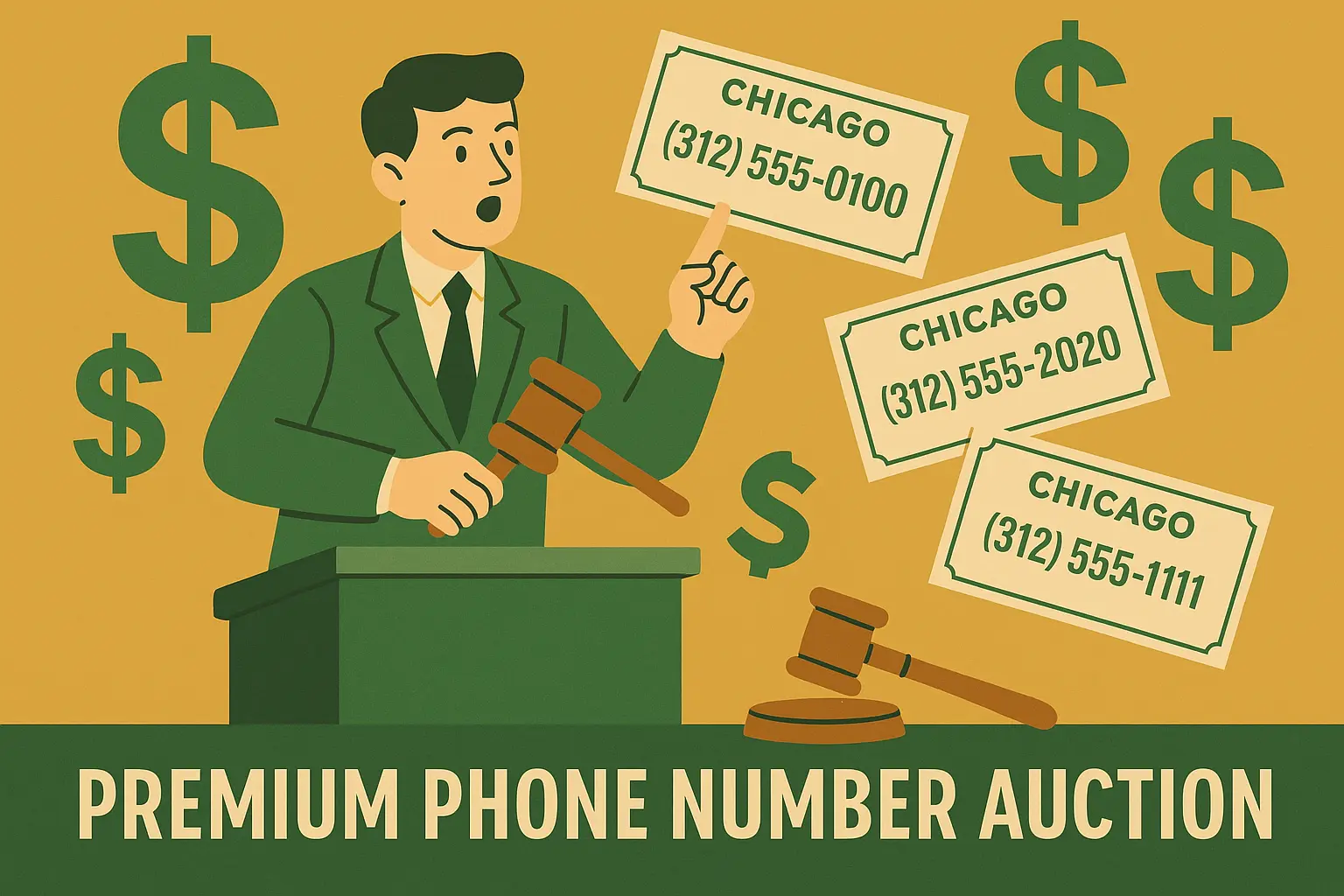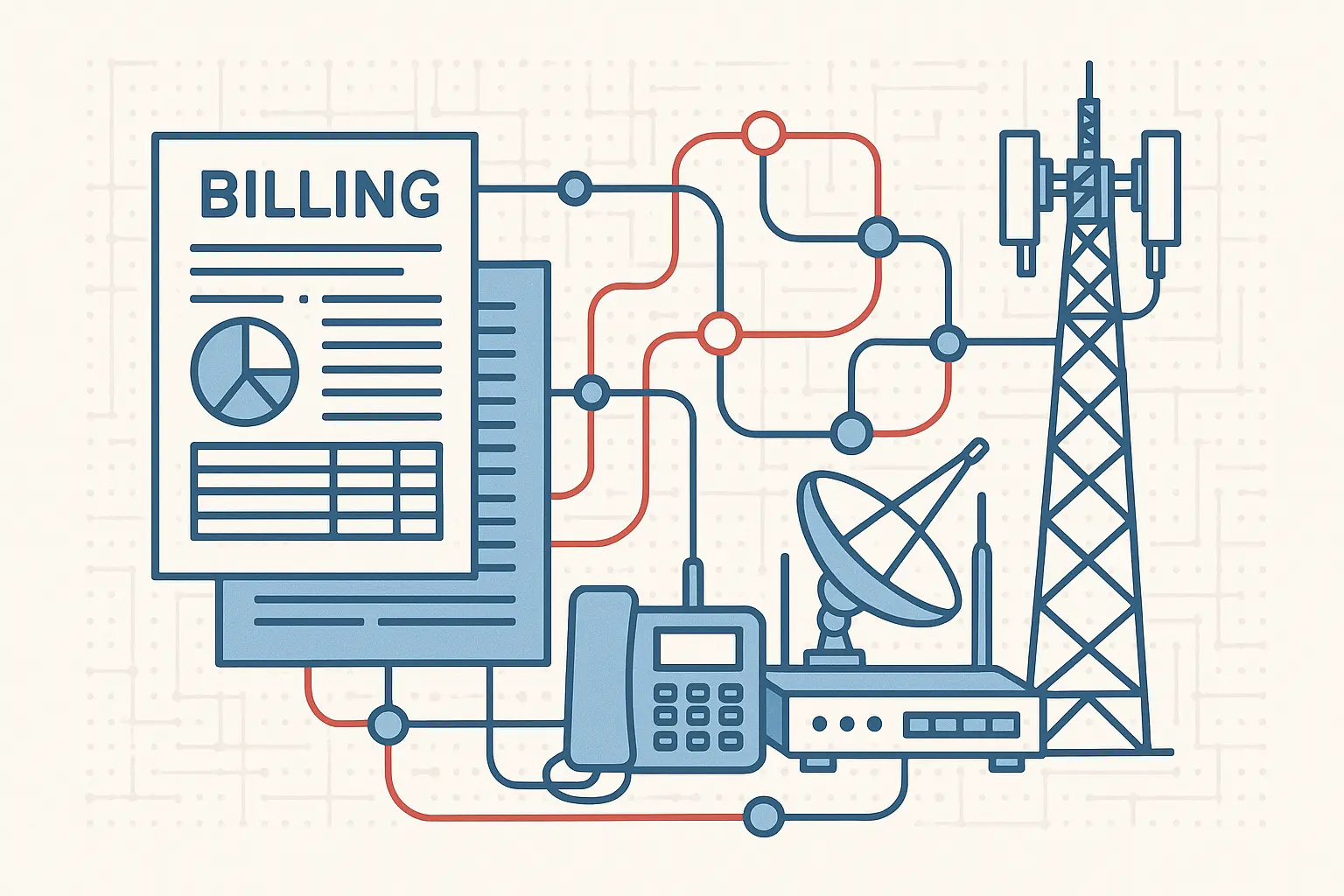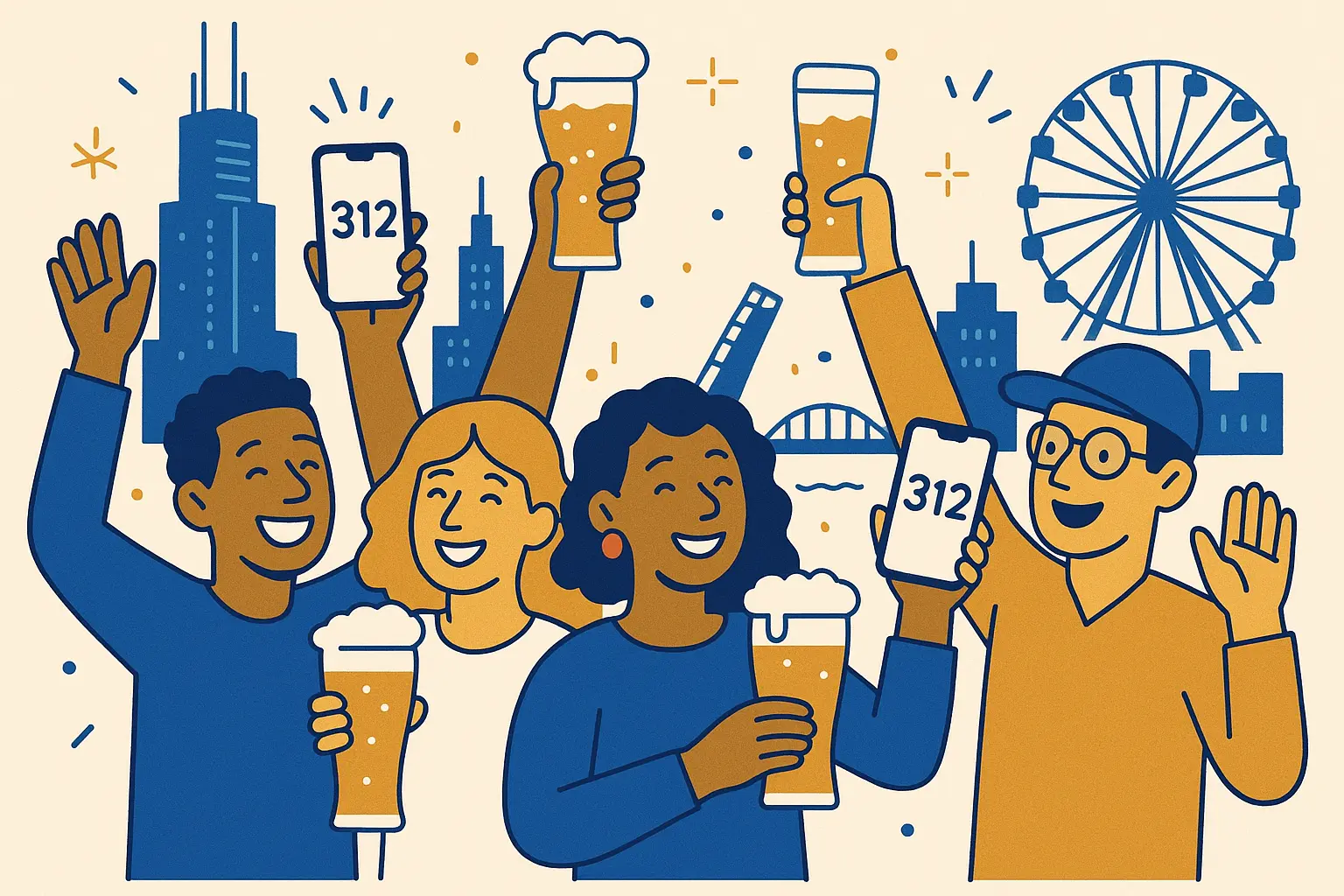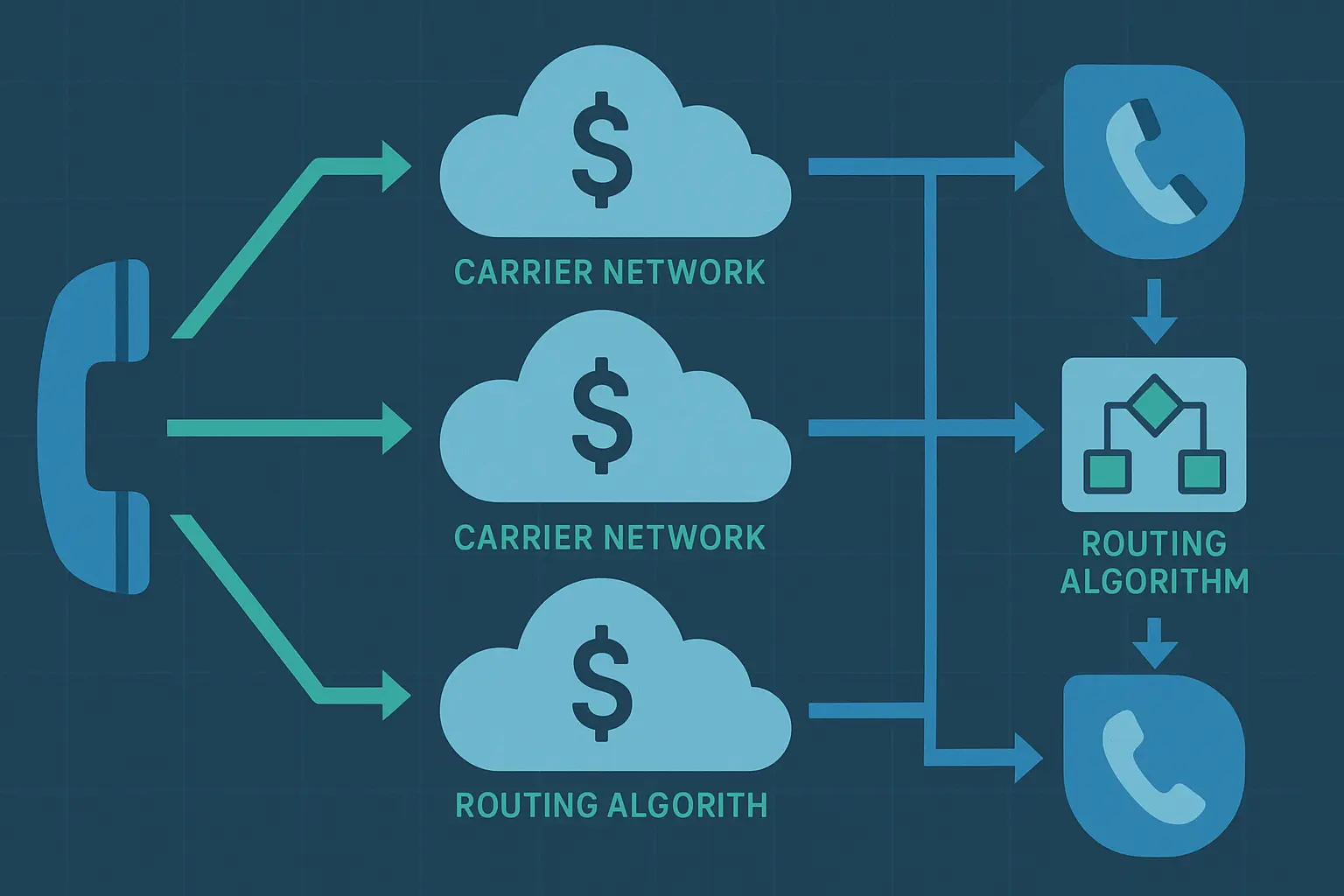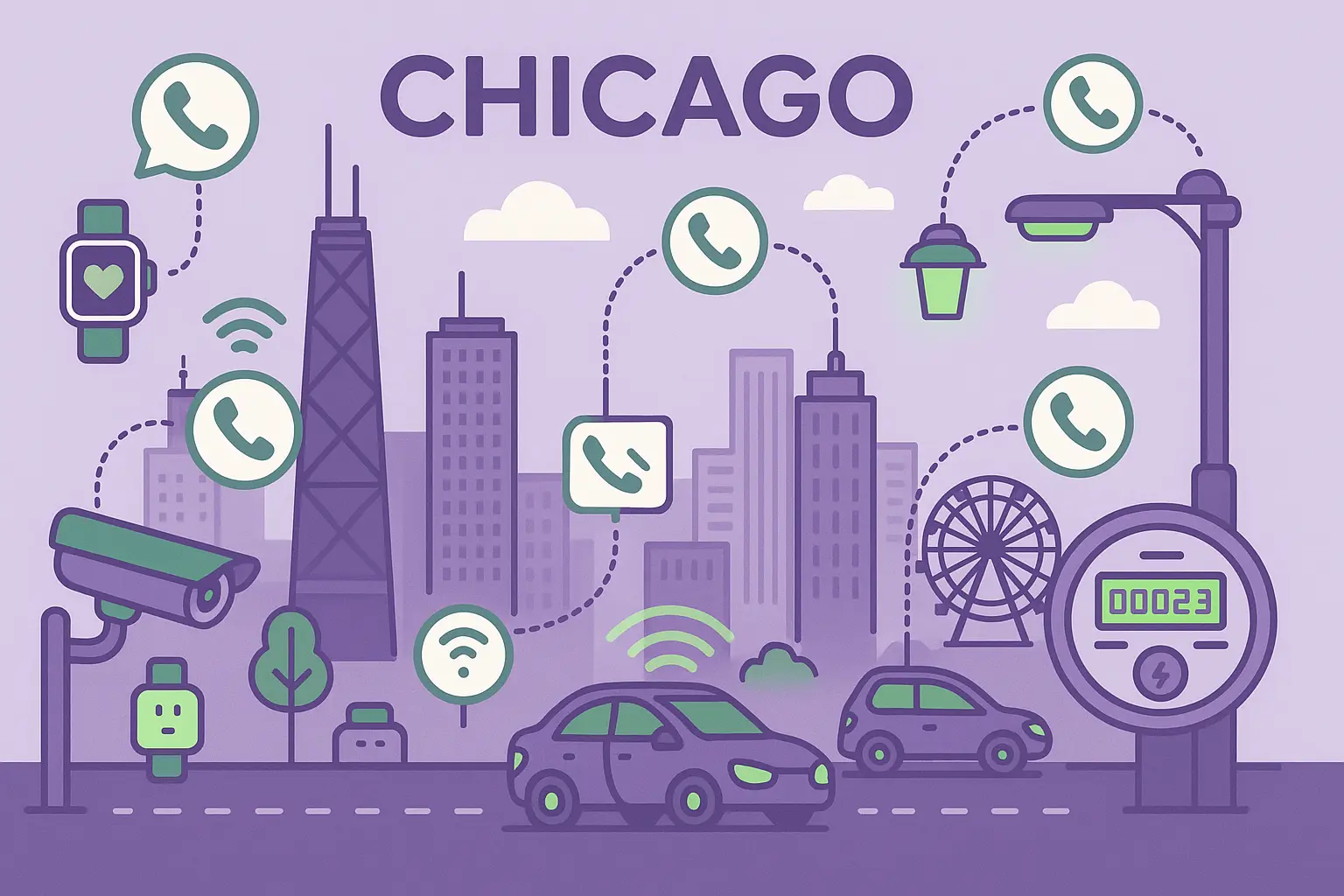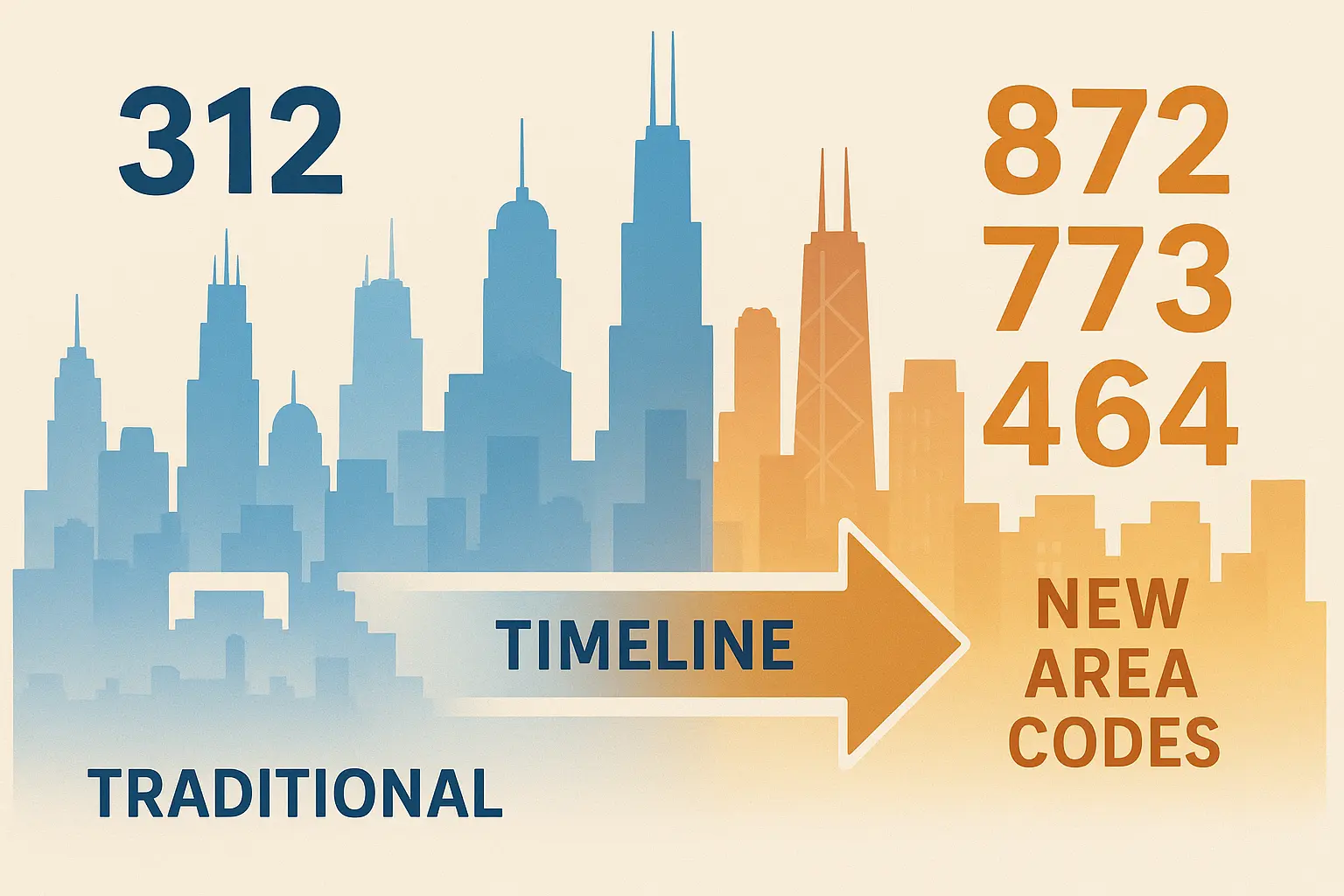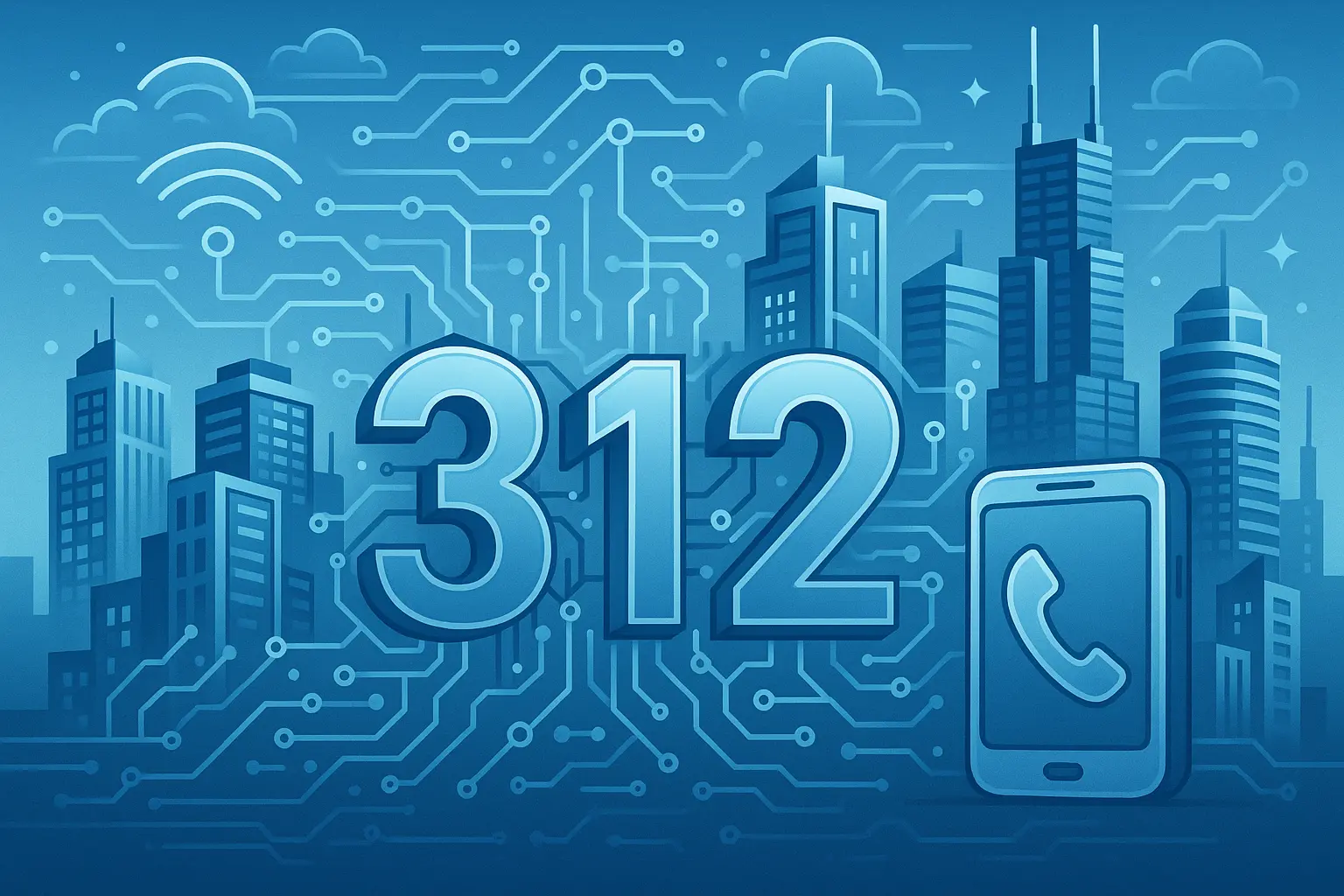If you have a Chicago phone number that starts with 312, you’re holding onto something pretty special. Most people don’t realize that their “regular” phone number could actually be worth thousands of dollars – or that keeping it while living somewhere else might be causing weird problems with their bank.
I’ve been digging into how phone numbers actually work for years, and the 312 area code is fascinating. 312 serves the Chicago Loop of the city of Chicago, Illinois, encompassing only a few square miles, roughly bounded by North Avenue to the north, Ashland Avenue to the west, Lake Michigan on the east, and 31st Street on the south according to AreaCode.org. It only covers a tiny slice of Chicago – basically just downtown and the immediate area – but it carries way more weight than you’d expect.
Here’s what most people don’t know:
-
Some 312 numbers sell for $15,000+ because they spell out words or have memorable patterns
-
Your bank might flag your account if you travel with a 312 number (seriously)
-
International clients often pay extra to call 312 numbers vs other Chicago area codes
-
We’re actually running out of 312 numbers, and it’s happening faster than anyone expected
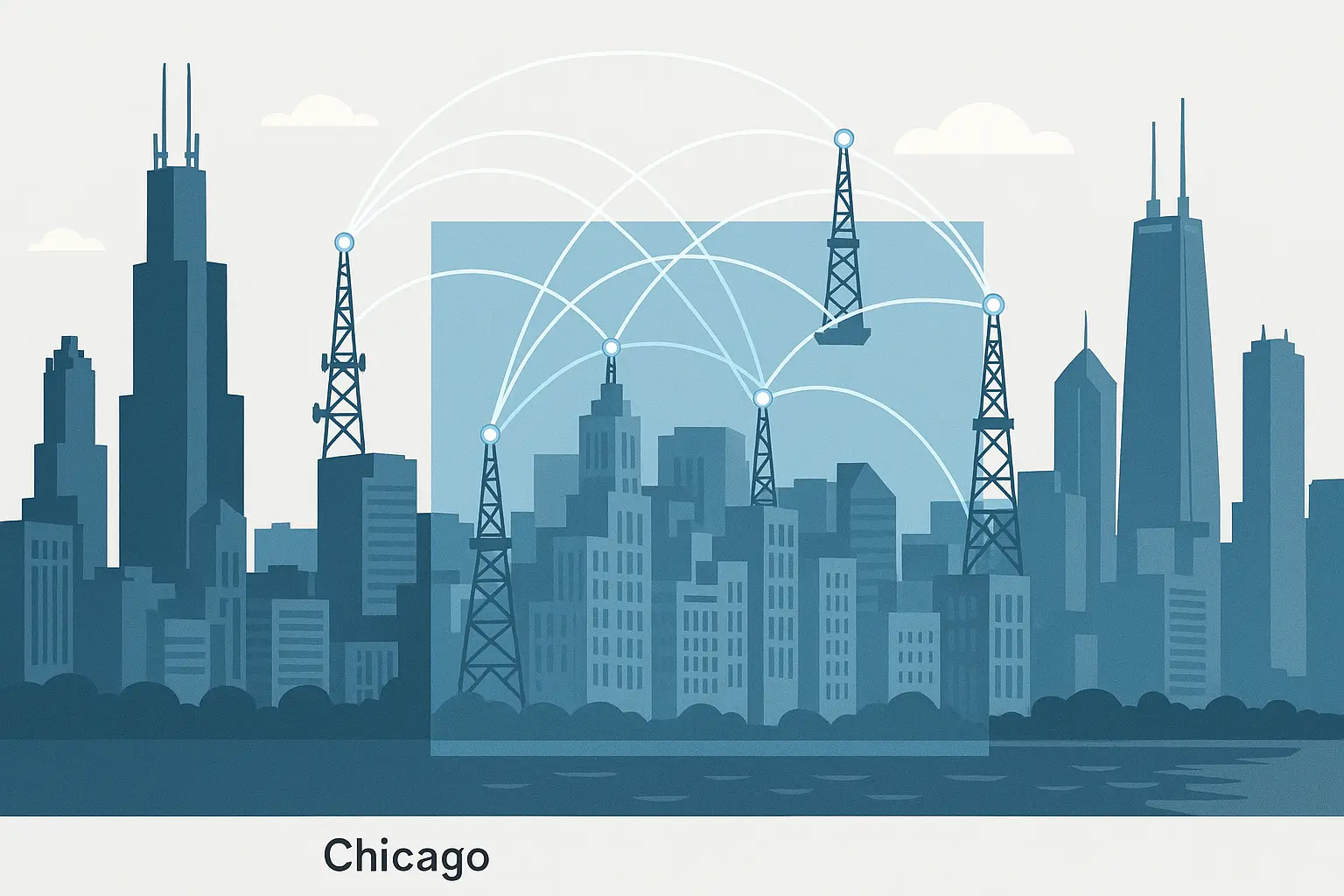
Table of Contents
Table of Contents
-
What Actually Happens When You Make a Call
-
Why Some 312 Numbers Are Worth Thousands
-
Why Good 312 Numbers Are Getting Harder to Find
-
When Your Phone Number Becomes a Security Problem
-
Why People Fight to Keep Their 312 Numbers
-
How Phone Companies Make Money Off Your Calls
-
Why International Clients Pay More to Call You
-
The 312 Number Shortage That’s Coming Fast
TL;DR
-
Your 312 number works through a complex system with 773 and 872 that creates hidden costs and complications
-
Memorable 312 numbers sell for thousands in secondary markets – some businesses pay $15,000+ for the right number
-
Government rules create artificial scarcity by making carriers prove they’re using 75% of numbers before getting more
-
Keeping your 312 number while living elsewhere can trigger fraud alerts and cause banking headaches
-
Businesses pay premium rates for 312 numbers because clients see them as credibility markers
-
Your calls get routed through multiple carriers in split-second bidding wars that affect your bill
-
International callers often face higher charges for 312 numbers compared to other Chicago area codes
-
The 312 area code is running out of numbers faster than expected due to smart city technology and business demand
What Actually Happens When You Make a Call
Most people think making a phone call is simple – you dial, it rings, someone answers. But your 312 number actually triggers a pretty wild behind-the-scenes process that most folks never think about.
When you dial out from your 312 number, your call doesn’t go straight to whoever you’re calling. Instead, it bounces through a network of switching centers, each one making split-second decisions about the best route based on cost, network traffic, and agreements between phone companies.
The Total Population of Area Code 312 is 1,610,981 with a 68.9% of People in the Labor Force and an Unemployment Rate of 6.9% according to ZipAtlas, making it one of the busiest telecommunications regions in the country. All those people making calls creates massive demand for a tiny geographic area.
The Three-Way System You Never Knew About
Here’s something that surprised me when I first learned it: Chicago actually has three area codes (312, 773, and 872) that all work together in what’s called an “overlay system.” This means the same neighborhood might have all three area codes, and the phone companies have to coordinate everything perfectly.
Your 312 number has to play nice with numbers from the other area codes, which creates complexity that gets passed down to you as a customer. Ever wonder why you sometimes have to dial all 10 digits for a “local” call? This is why.
Understanding how complex number formatting can get becomes crucial for businesses, which is why knowing how to enter a phone number in international format can prevent costly routing errors for Chicago-based companies.
Why Some Numbers Just Don’t Exist
Ever try to call a number and get told it doesn’t exist, even though it follows the right pattern? Phone companies don’t actually give out all the numbers in each batch they receive. They get numbers in blocks of 1,000, but only about 60% ever make it to customers.
The rest get held back for emergency services, technical operations, and regulatory requirements. So when you’re wondering why you can’t get that perfect 312 number, it might be sitting in a reserve pile somewhere, never to be used by a regular person.
|
What Numbers Get Used For |
Percentage Reserved |
|---|---|
|
Regular customers |
60% |
|
911 and emergency services |
15% |
|
Technical stuff |
10% |
|
Government requirements |
10% |
|
Future expansion |
5% |
The 911 Problem Nobody Talks About
Here’s something that should concern everyone: when you call 911 from a 312 number, the system has to figure out where you actually are versus where your number was originally assigned. With so many people keeping their numbers when they move, this creates delays that first responders have to deal with.
I’m not trying to scare anyone, but it’s worth knowing that your 312 number might not immediately tell emergency services where you’re calling from.
Why Some 312 Numbers Are Worth Thousands
This is where things get really interesting. I’ve watched Chicago businesses pay $15,000 for a single phone number because it spelled out their company name perfectly. The 312 area code has created its own little economy where the right combination of digits can be worth more than a used car.
A friend of mine runs a pizza place and spent months trying to get 312-PIZZA-NOW (which doesn’t actually work mathematically, but you get the idea). When he finally found a number that spelled something close, he paid $8,000 for it. His pizza isn’t any better, but that memorable number definitely helps with orders.
What Makes a Number Valuable
Not all 312 numbers are created equal. The valuable ones usually have patterns that are easy to remember, spell out words, or have some historical significance. Numbers that used to belong to famous Chicago businesses can sell for premium prices decades later.
Here’s what I’ve seen numbers actually sell for:
|
Type of Number |
What People Pay |
Who Buys Them |
|---|---|---|
|
Repeating digits (312-777-7777) |
$15,000-$30,000 |
Luxury businesses |
|
Spells CHICAGO |
$10,000-$25,000 |
Tourism companies |
|
Sequential (312-123-4567) |
$2,000-$8,000 |
Professional services |
|
Former famous business numbers |
$3,000-$20,000 |
Anyone wanting that history |
The Corporate Hoarding Game
Large Chicago companies often sit on dozens of 312 numbers they barely use. They’re not being wasteful – they’re being strategic. It’s like buying up real estate in a good neighborhood. Even if you don’t need all of it right now, you don’t want your competitors to have it.
I know a law firm that keeps 20+ unused 312 numbers just to prevent other firms from getting them. They pay the monthly fees on numbers they never answer, but it’s worth it to control that digital territory.
Why Businesses Treat Numbers Like Investments
Smart business owners have figured out that memorable 312 numbers appreciate in value over time. As the area code gets closer to running out of available numbers, the good ones become more valuable.
It’s basic supply and demand, but most people don’t think of phone numbers this way. A restaurant owner who bought 312-EAT-GOOD five years ago could probably sell it for double what he paid today.
Why Good 312 Numbers Are Getting Harder to Find
Here’s where the government comes in, and it’s more complicated than you’d think. The Federal Communications Commission has rules about how phone companies can get new batches of numbers, and these rules are creating artificial scarcity.
Phone companies can’t just ask for more 312 numbers whenever they want them. They have to prove they’re using at least 75% of their current numbers before they can get more. This creates a constant juggling act where companies have to predict how many customers they’ll get while making sure they don’t run out of numbers to give them.
The 75% Rule That Controls Everything
This rule sounds reasonable in theory, but in practice, it creates weird situations. A phone company might have thousands of 312 numbers sitting unused in their system, but they can’t give them to customers yet because they haven’t hit that 75% threshold.
Let me give you a real example: Verizon gets 10,000 new 312 numbers in January. They can only assign about 6,000 to customers right away. The other 4,000 have to be held back for technical operations, emergency services, and regulatory compliance. So even though thousands of numbers exist, they’re not available to regular people.
How Phone Companies Game the System
Phone companies have gotten really good at working within these rules to maximize their number inventory. They use algorithms to track usage patterns, predict seasonal changes, and sometimes even assign numbers to internal systems just to boost their utilization percentages.
It’s not exactly cheating, but it’s definitely working the system to their advantage while making it look like they’re following all the rules perfectly.
The Pooling System Nobody Understands
There’s this thing called “thousand-block pooling” that most people have never heard of, but it directly affects whether you can get a good 312 number. Basically, multiple phone companies share batches of numbers, which creates complex billing relationships that customers never see.
When carriers share number blocks, it can make your bill more confusing and sometimes means you get transferred between customer service departments when you have problems.
When Your Phone Number Becomes a Security Problem
This is the part that really surprised me when I started researching this stuff. Your 312 number might actually be putting you at risk in ways you never considered, especially if you’ve moved away from Chicago but kept your number.
Modern banking and security systems still make assumptions about where you are based on your area code. When those assumptions are wrong, it can create problems ranging from annoying to genuinely dangerous.
For businesses managing multiple 312 numbers across different locations, implementing proper text message forwarding to email addresses becomes essential for maintaining security oversight when employees work remotely while keeping their Chicago numbers.
Banking Problems You Didn’t See Coming
I talked to a guy who moved from Chicago to Phoenix but kept his 312 number for business reasons. His bank kept flagging his account for “suspicious activity” every time he tried to use his debit card in Arizona because their system expected him to be in Chicago.
This isn’t just inconvenient – it can be genuinely problematic when you’re traveling and suddenly can’t access your money because your phone number doesn’t match your location.
Many banks still use area codes as one factor in their fraud detection systems. They assume your 312 number means you’re in Chicago, so when you’re clearly somewhere else, it can trigger alerts that lock you out of your accounts.
How Scammers Exploit Area Code Trust
Criminals have figured out that people are more likely to answer calls from area codes they recognize. They use 312 numbers to appear local to Chicago victims, which increases their success rates for phone scams and identity theft attempts.
The trust people place in familiar area codes has become a weapon that fraudsters use against them. When someone sees a 312 number calling, they’re more likely to assume it’s legitimate, even if the caller is actually halfway around the world.
The Remote Work Authentication Mess
With so many people working remotely now, business security systems are constantly confused by employees who have 312 numbers but are logging in from other states. IT departments spend tons of time managing exceptions and workarounds for people who’ve kept their Chicago numbers after relocating.
I know a financial advisor who moved to Phoenix but kept her 312 number for credibility with Chicago clients. Her company’s security software flags her as suspicious every single day because it expects her to be calling from Chicago, not Arizona. IT has to manually approve her access constantly.
Why People Fight to Keep Their 312 Numbers
Despite all the complications I’ve mentioned, people are incredibly attached to their 312 numbers. There are real psychological and business reasons why someone would turn down a better phone plan just to keep those three digits.
The emotional attachment runs deep enough that Chicago celebrates it. On March 12th (3/12), “more
The emotional attachment runs deep enough that Chicago celebrates it. On March 12th (3/12),
“more than forty bars and restaurants around the city offer a pint of Goose Island’s 312 Urban Wheat Ale for just $3.12” according to ABC7 Chicago. That’s how embedded this area code is in the city’s identity.
Professional Credibility Still Matters
Your 312 number carries weight in business situations, even when you’re serving clients nationally or internationally. It immediately signals that you have Chicago connections and local knowledge, which can be the difference between getting a callback or being ignored.
I’ve tested this myself. People with 312 numbers get called back more often than those with 773 or 872 numbers, even when they’re providing identical services. It’s not fair, but it’s reality.
Real estate agents and lawyers are especially protective of their 312 numbers because clients often prefer working with someone who appears to be local. A 312 area code on a business card immediately establishes Chicago credibility in ways that other numbers simply can’t match.
How Contact Lists Work in Your Favor
Here’s something most people don’t think about: the way people organize their phone contacts often puts 312 numbers at an advantage. When someone scrolls through their contacts looking for Chicago connections, 312 numbers appear first and get called more frequently.
This isn’t just theory – it’s measurable. Businesses with 312 numbers report higher callback rates and more frequent contact from existing clients compared to businesses with other Chicago area codes.
The Generation Gap in Phone Number Value
Younger professionals are changing the game somewhat. Millennials and Gen Z conduct most of their actual communication through messaging apps, which potentially reduces the long-term value of premium phone numbers.
However, they still maintain 312 numbers for professional credibility while doing their real communicating through other channels. So the number becomes more of a business card than an actual communication tool.
How Phone Companies Make Money Off Your Calls
Here’s something that’ll blow your mind: every time you make a call from your 312 number, there’s a split-second bidding war happening behind the scenes. Your phone company’s computer is literally shopping around for the cheapest way to connect your call, sometimes bouncing it through three different companies to save a few cents.
And guess what? They pocket the difference.
I learned this when a buddy of mine who runs a small law firm in the Loop showed me his phone bill. Same type of calls, same destinations, but wildly different charges depending on the day of the week. Turns out, carrier rates change constantly based on network traffic and agreements most of us never hear about.
The Hidden Routing Game
When you dial out from your 312 number, your call might ping through AT&T’s Chicago hub, hop over to Verizon’s network in Cleveland, then land on T-Mobile’s system in Buffalo before reaching whoever you’re calling in New York. All of this happens in milliseconds, and each handoff generates revenue for someone.
The crazy part? You can actually do something about this if you’re a business owner. Companies that understand the game can save thousands by tweaking their phone systems to automatically find cheaper routes. Most businesses never bother to optimize this stuff, so they just eat the extra costs.
Why Your Business Phone Bill Makes No Sense
If you’ve ever stared at a business phone bill wondering why some calls cost way more than others, this is why. That call to your client’s 312 number might cost triple what it should because of how the carriers route it.
The crazy part? You can actually do something about this. Businesses that understand the game can save thousands by tweaking their phone systems to automatically find cheaper routes. Most companies never bother to optimize this stuff, so they just eat the extra costs.
Pro tip: If your company makes a lot of calls between different 312 numbers, ask your carrier about “least cost routing.” It’s basically letting your phone system automatically shop for the cheapest path for each call.
When managing multiple 312 numbers for different departments, businesses often struggle with message management across platforms, making forwarding text messages to Slack channels an efficient solution for centralizing Chicago-based communications.
The Rate Difference Nobody Explains
Different carriers charge dramatically different amounts for identical calls, and this pricing complexity is rarely explained to customers. I’ve seen companies pay triple rates for certain 312 destinations without realizing they could restructure their service to cut costs.
The difference between “local” and “long distance” rates for 312 calls creates opportunities for businesses to save money if they understand how the overlay system affects pricing. Most people just pay whatever shows up on their bill without questioning it.
Why International Clients Pay More to Call You
This one really gets me fired up because I’ve seen it hurt so many Chicago businesses. Your international clients might be paying way more to call your 312 number than they would to call other Chicago numbers. And most business owners have no clue this is happening.
I was talking to a consultant who couldn’t figure out why his European clients always seemed reluctant to call. Turns out, their phone company was charging premium rates for 312 numbers – like 40% more than calling a 773 number in the exact same neighborhood.
International clients calling Chicago businesses often struggle with proper formatting, which is why understanding the US phone number format with country code becomes crucial for 312 area code holders conducting global business.
The Hidden Cost Your Clients Won’t Tell You About
Some international carriers still think 312 numbers are “premium business lines” and charge accordingly. Your client in London might be paying $2 per minute to call your 312 number but only $1.20 to call your competitor with a 773 number.
They’re probably not going to complain about it directly – they’ll just call less often or find reasons to email instead.
What you can do:
-
Give international clients a secondary number (like a 773) for routine calls
-
Set up a VoIP line they can reach you on
-
At minimum, let them know this might be an issue so they can shop around for better international calling plans
When Technology Fails You
Here’s another headache: some international carriers have outdated systems that don’t properly understand Chicago’s overlapping area codes. I’ve heard of cases where calls to 312 numbers just… don’t go through. The caller gets a busy signal or wrong number message, and there’s nothing you can do about it from your end.
One architect told me he lost a potential project because the client in Germany couldn’t get through to his 312 number for three days straight. By the time they figured out the problem, the client had moved on to someone else.
The VoIP Workaround Problem
Voice over Internet Protocol services can bypass traditional international calling charges to 312 numbers, but the quality and reliability depend entirely on how these services connect calls in the US. Cheap VoIP often means poor call quality that can hurt business relationships.
I’ve seen deals fall through because international clients couldn’t reliably reach Chicago businesses due to carrier routing problems. The complexity multiplies when you add international routing into the mix.
The 312 Number Shortage That’s Coming Fast
Okay, here’s the big one that most people aren’t talking about yet: we’re running out of 312 numbers. Not in some distant future – it’s happening now.
Chicago keeps growing, businesses keep opening, and every smart device, security system, and connected car needs its own number. The math doesn’t work out.
With Average earnings in Area Code 312 being $3,376,252 for men and $2,434,679 for women, a difference of 27.9% according to ZipAtlas, the economic stakes of maintaining 312 numbers for business credibility have never been higher.
Why This Affects You Right Now
Even if you already have a 312 number, this shortage is changing how valuable it is. Good 312 numbers are becoming like vintage cars – the longer you hold onto them, the more they’re worth.
But here’s the catch: if you’re a business owner, you need to start thinking about what happens when your employees can’t get 312 numbers anymore. Are you going to make new hires use 773 or 872 numbers? How does that affect your brand consistency?
Smart businesses are already:
-
Buying up extra 312 numbers while they can still get them
-
Planning communication strategies that don’t rely solely on phone numbers
-
Training staff to use the full 10-digit dialing for all Chicago calls
The Internet of Things Problem
This is the part that really worries me. Chicago’s rolling out smart city technology everywhere – connected parking meters, traffic sensors, air quality monitors. Each one needs a phone number for its cellular connection.
We’re talking about thousands of devices that will eat up 312 numbers faster than you can imagine. And unlike human customers who might switch carriers or move away, these devices will hold onto their numbers indefinitely.
The city’s own technology initiatives are accelerating the very shortage that will make Chicago numbers more scarce and valuable.
The pressure on 312 numbers is intensified by the area’s economic concentration, with Per Capita income in Area Code 312 at $65,563 and Median Household Income at $97,843 according to ZipAtlas, creating high demand for prestigious numbers in a limited geographic area.
When Everything Needs a Phone Number
Chicago’s smart city projects, connected parking meters, and IoT infrastructure all require phone numbers for cellular data connections. This industrial demand for numbers is pushing the 312 area code toward exhaustion faster than anyone anticipated.
312 numbers are being consumed by machines faster than humans, creating a supply crisis that will force fundamental changes in how we think about phone number allocation.
What Happens Next?
Nobody wants to say it out loud, but Chicago will probably need a new area code within the next few years. When that happens, the 312 numbers become even more prestigious – like having an original Chicago phone number from the “before times.”
If you’ve got a good 312 number, especially one that spells something or has a memorable pattern, hold onto it. If you’re a business owner, start planning now for how you’ll handle the transition when it comes.
The cultural significance of 312 extends beyond telecommunications into fashion and lifestyle, as seen in products such as the “Jordan Legacy 312 Low Rattan” sneaker that “pays homage to the iconic basketball legacy of Michael Jordan while incorporating modern streetwear flair” according to Kicks On Fire, demonstrating how the 312 identifier has become a Chicago brand symbol across industries.
Technology Changes Everything
Modern business phone systems treat 312 numbers as one identifier among many, integrating with email, instant messaging, and video conferencing to create comprehensive communication profiles. This convergence is changing how valuable traditional phone numbers really are in day-to-day business operations.
Your 312 number is becoming just one piece of a larger communication puzzle that includes your email, Slack handle, Teams account, and social media profiles. Businesses are learning to manage these integrated identities rather than focusing solely on phone number prestige.
As businesses transition to unified communications systems, many discover they need better ways to manage SMS from their legacy 312 numbers, which is where forwarding text messages to API endpoints provides seamless integration with modern business platforms.
Your 312 Number Action Plan
Look, I know this is a lot to digest. Most people never think about their phone number as anything more than… well, a phone number. But your 312 number is actually a pretty valuable piece of digital real estate.
Here’s what you should do right now:
If you have a 312 number:
-
Don’t give it up unless you absolutely have to
-
If it spells something or has a pattern, consider it an asset
-
Make sure your bank and important accounts know you might travel with this number
-
Set up call forwarding so you never miss calls
If you’re a business owner:
-
Audit all your 312 numbers – which ones are customer-facing?
-
Consider buying a few extra memorable 312 numbers while you still can
-
Plan for employees who won’t be able to get 312 numbers in the future
-
Set up systems to manage texts and calls across multiple numbers
If you don’t have a 312 number but want one:
-
Act fast – the good ones are disappearing
-
Focus on numbers that are easy to remember or spell something relevant
-
Expect to pay premium prices for anything decent
312 Number Management Checklist:
-
Audit all active 312 numbers across departments
-
Document which numbers are customer-facing vs internal
-
Identify vanity numbers with brand value
-
Plan backup communication channels
-
Update business cards and marketing materials
-
Configure call forwarding to mobile devices
-
Set up SMS forwarding for important numbers
-
Review international calling policies
-
Train staff on overlay dialing requirements
-
Establish number retention policies for departing employees
Managing multiple 312 numbers across different business functions creates communication chaos that most Chicago companies struggle with daily. Auto Forward SMS solves this by centralizing all your text message management – forwarding SMS from various 312 numbers to designated email addresses or team collaboration tools.
Whether you’re maintaining prestigious 312 numbers
Whether you’re maintaining prestigious 312 numbers for credibility while supporting remote employees, or need to ensure compliance archival of all text communications, Auto Forward SMS bridges the gap between traditional telecommunications and modern business workflows. Ready to streamline your 312 number management? Try Auto Forward SMS today and stop missing important messages scattered across multiple Chicago numbers.
The Bottom Line
Your 312 area code isn’t just about making phone calls anymore. It’s about credibility, brand value, and navigating a complex system that most people don’t understand.
The telecommunications industry has gotten incredibly complicated, but the basic rule hasn’t changed: location matters, scarcity creates value, and the people who understand the system have an advantage over those who don’t.
Chicago’s 312 area code is a perfect example of how something as simple as a phone number can become a strategic business asset. Whether you’re holding onto one for sentimental reasons or using it to build credibility with clients, understanding what’s really happening behind the scenes helps you make better decisions.
The 312 shortage is real, the technology is changing fast, and the businesses that adapt first will have the biggest advantage. Your phone number might seem like a small detail, but in Chicago’s competitive market, small details often make the biggest difference.
